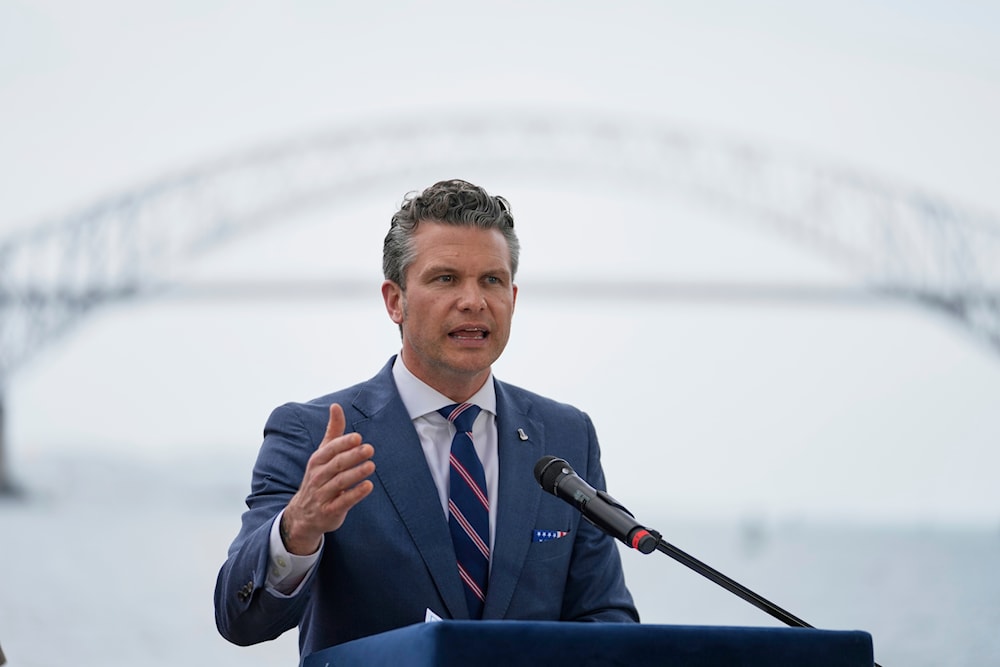US will not allow China to jeopardize Panama Canal operations: Hegseth
The US Secretary of Defense warns that China's influence in the Panama Canal will be removed, claiming that the Asan giant poses a threat to Panama, the US, and the world.
-

US Defense Secretary Pete Hegseth speaks at Port of Rodman in West Panama, on Tuesday, April 8, 2025 (AP)
The US will prevent China from disrupting Panama Canal operations, Defense Secretary Pete Hegseth stated during his trip to the Central American country on Tuesday.
"Today, the Panama Canal faces ongoing threats," Hegseth said in a speech at a police station at the entrance of the shipping route. "The United States of America will not allow communist China or any other country to threaten the canal's operation or integrity," he added.
"I want to be very clear. China did not build this canal. China does not operate this canal. And China will not weaponize this canal," Hegseth stated, describing the maritime waterway as a "wonder of the world."
Standing next to Panamanian President Jose Raul Molino, Hegseth stated that the United States and Panama would collaborate to remove what he called "Chinese influence" from the Panama Canal, ensuring it remains accessible to every country by leveraging the unmatched deterrent capability of the world's most powerful, efficient, and deadly military force.
Hegseth claimed that China's control over critical infrastructure in the maritime route gives Beijing the ability to conduct spying operations across Panama, making both Panama and the United States "less secure, less prosperous and less sovereign."
The Secretary of Defense's visit to Panama is the second visit by a US official since Donald Trump took office in January, when he vowed that the United States would take back the Panama Canal in a bid to counter China's alleged dominant sway over the water passage.
The United States constructed the canal over a century ago before transferring control to Panama in 1999, and today, the Hong Kong-based company, Panama Ports, manages two key ports at both the Atlantic and Pacific entrances of this vital waterway, which facilitates the passage of approximately five percent of the world's total maritime trade.
The concession for Panama Ports to operate Balboa port on the Pacific side and Cristobal port on the Atlantic side of the canal was initially awarded in 1997 and later extended for an additional 25 years in 2021, but after facing repeated threats from former US President Donald Trump about a potential seizure of the canal, the Panamanian government has increased pressure on CK Hutchison, the parent company of Panama Ports, to exit the country.
In March, CK Hutchison reached a $19 billion cash deal to sell its portfolio of 43 ports across 23 countries—including its two strategic canal terminals—to a consortium led by US investment giant BlackRock.
Just before Hegseth's visit, Panama's comptroller disclosed that the audit had uncovered numerous contract violations and claimed that the country was owed $1.2 billion by the operator, though the statement did not provide further details on the alleged breaches or the unpaid sum.
China slams US attempts to undermine Panama ties as latter yields to pressure
In early February, China strongly condemned US attempts to disrupt its relations with Panama through pressure and threats, Chinese Assistant Foreign Minister Zhao Zhiyuan stated during a meeting with Panamanian Ambassador to China Miguel Lecaro.
"China-Panama relations never target any third party and should not be disrupted by any third party," Zhao said, urging Panama to resist external interference and consider the long-term interests of both nations.
The statement followed Panamanian President Jose Raul Mulino’s announcement that Panama had formally withdrawn from China’s Belt and Road Initiative (BRI). Mulino denied any link between the decision and US Secretary of State Marco Rubio’s recent visit to the country.
In response, China lodged a formal protest with Panama, with Zhao condemning what he described as US efforts to "sabotage Belt and Road cooperation through pressure and threats."

 4 Min Read
4 Min Read










